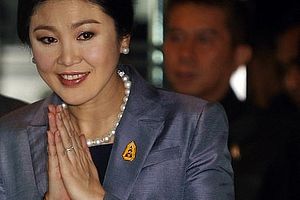This week, Thailand’s Constitutional Court, the country’s highest court, ruled that caretaker prime minister Yingluck Shinawatra had abused her power and should be removed from office, along with nine other ministers in her cabinet. The charges were related to the removal from his position of a former civil servant three years ago. The New York Times has a summary of the situation here.
There is no real precedent for the court’s decision to remove Yingluck and the other ministers, and no real textual basis for the decision in Thailand’s constitution. But the Constitutional Court has in recent years shown time and again that it needs no precedent or constitutional basis, in its mind, to make decisions. The court also repeatedly has demonstrated that it comes down firmly on the side of the anti-government protestors in Bangkok, and generally on the side of the conservative, royalist Bangkok elites, who have become increasingly suspicious of and even opposed to democracy in Thailand.
Yet this verdict was not a total win for the protestors and royalist elites; the court may want to hedge its bets, since it knows that Yingluck, her brother Thaksin Shinawatra, and their supporters, who have elected pro-Thaksin governments for over a decade, comprise a powerful bloc in Thailand. The court could have thrown out Yingluck’s whole cabinet rather than just the caretaker prime minister and nine other ministers. There would have been no precedent or constitutional basis for this decision, either, but it was widely predicted before the verdict by many Thai commentators. This verdict would have possibly paved the way for Thailand’s senate to appoint a new caretaker prime minister, one who might not have been a Shinawatra ally.
Instead, the court left some ministers in place. This meant the caretaker government was allowed to appoint a new caretaker prime minister to replace Yingluck, until parliamentary elections are held again. (Parliamentary elections held in February failed, as the opposition Democrat Party boycotted and demonstrators blocked many polling booths.) The caretaker government thus appointed as prime minister Deputy Prime Minister Niwattumrong Boonsongpaisan, another close ally of Yingluck and her brother Thaksin; the new prime minister formerly served as a senior executive in a Shinawatra family company. As a result, neither Thaksin supporters nor the conservative opponents of Thaksin, Yingluck, and the Puea Thai party will be fully satisfied by the court’s decision. Caretaker prime minister Yingluck’s party has referred to the court’s decision as a judicial “coup d’etat” but opponents of the government also are not openly celebrating, and already are condemning the choice of the next prime minister.
So, the political temperature will increase in Bangkok. The caretaker government likely will push ahead for new parliamentary elections in July, and both the street demonstrators and the opposition Democrat Party likely will push for a boycott of these elections. The demonstrators already have announced that they will hold another massive rally designed to bring down the government later this week. Pro-government demonstrators have responded by declaring that the decision means total war in Thailand.
Worse, the case further undermines Thailand’s political institutions, adding to the poisonous political climate in the kingdom and pushing the country further down the road toward violence and a total democratic meltdown. As I have previously noted in my chapter on Thailand in the CFR book Pathways to Freedom: Political and Economic Lessons from Democratic Transitions, over the past decade, as Thailand’s democracy has regressed, the country’s political institutions have become increasingly polarized and, as a result, untrusted by the majority of Thais. Even the king, formerly seen as above politics and able to mediate political disputes, has lost the trust of many Thais. As I wrote in that chapter:
Both Thaksin and the royalist elite [have] weakened the rule of law. Thaksin undermined new institutions created by the constitution, pressured some judges and forced out others, and packed parliament’s upper house with cronies. Instead of trying Thaksin’s alleged crimes in court or changing the law, his opponents in the elite and middle classes fought him through street protests and other extra-constitutional means.
Now, the increasingly weak rule of law in Thailand has collapsed entirely.
Joshua Kurlantzick is a fellow for Southeast Asia at the Council on Foreign Relations. He blogs at Asia Unbound, where this piece originally appeared. You can follow him on Twitter: @JoshKurlantzick

































